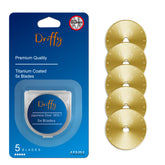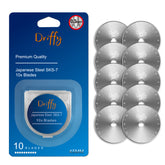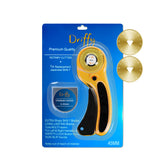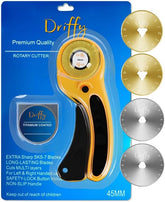Choose the best threads for quilting and sewing
As with choosing your needles, there’s no single “one fits all” thread for patchwork and quilting.
There are a lot of threads that will serve you well for a number of different tasks, though.
It’s therefore a good idea to have a selection in your kit, and know how to choose the right ones when you’re shopping.
Lots of thread choice
There seems to be an endless selection of choice of thread - and it can seem a bit bewildering.
Even though there are thousands of different colours, that can sometimes be the easiest aspect of selecting.
A word of caution is that patchwork threads aren’t always labelled in that way - so sometimes it can be a bit harder to know which thread is right for you.
Also, if you’re hand quilting, you’ll have to choose different threads than you’d have if you were machine quilting as they’re manufactured in different ways.
Similarly, machine threads won’t be a good choice to use if you’re assembling a patchwork.
Here’s a handy guide to thread choices and their uses.
Cotton and Polyester Threads
When cotton fibres are spun together and twisted into a narrow strand of yarn - that’s commonly known as cotton thread.
This yarn can then be twisted together with other pieces of the same to create thicker, stronger thread.
The same principle is applied to polyester, and the threads will look exactly the same, but just have a lot more stretch.
Polyester can also be turned into longer filament threads. However, a point to note is that over time, this man made thread can cut through cotton fabrics or generally cause damage to the finished quilt.
It’ll take many years for this to happen and it’s more commonly noticeable in quilts that originate from the 70s and 80s, when the thread was starting to be used more widely.
Most quilters will try and stick to cotton thread where possible - and in fact, will use this type of thread for any of their projects.
What thread do you need to piece a quilt?
The best choice of thread to piece a quilt is all-cotton.
The main reason for this is that it won’t wear down in the same way polyester will and it’s actually no stronger than the fabric that it is being sewn into.
This is the main reason that polyester thread wears quilts down over time.
Hand and machine quilting threads
As mentioned previously, threads that are used for hand quilting can’t be used in a machine.
This is because hand quilting threads are glazed - and if threaded into a machine can actually damage it.
The best place to start looking for thread recommendations for your machine is the manufacturer’s own website as they will have a compatible list.
One main point to remember is that when you’re machine quilting, you must change the tension of your sewing machine.
You must also use a different thread in the bobbin and always select the right needles - ones that will pierce the thread into the fabric without damaging either.
More thread idea for quilters
Here are a few more thread ideas for quilters to choose from:
Rayon isn’t typically used to sew patchwork, but are a good choice for quilters who want to do a lot of machine embroidery and decorative work.
This is because rayon threads are typically very colourful and noticeable.
Wool threads are a good choice if you want to embellish a project to give it a ‘homespun’ look.
This is because the threads are typically much thicker than other choices and will look hand sewn and ‘antique’.
Silk thread can be used for applique, as they are fine threads and will make stitches that appear to disappear in your fabric.
Opt for silk threads when beads are going to be sewn into the fabric.
Thread Sizes
This is an area that can cause some confusion as there is no standard designation for measuring thread.
Sometimes they’re listed as a fraction - so you might see 50/3 size thread. The first number tells you the weight of the thread, the second how many plies are in it.
The thread weight will go down as the weight numbers go up.
There is one other sizing system indicates only thread weight.
As this is a particularly complex area, choose threads based on recommendations from manufacturers, other quilters, and your own experience.











Leave a comment
Please note, comments need to be approved before they are published.